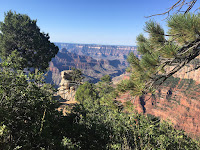― Woody Allen
Youth enjoys a certain blindness.
If you had asked me at the end of tenth grade where I planned to go to college and what I planned to study, I would have squirmed and looked at you with panic. Those are such typical grown-up questions, I'd think -- to ask me about what I planned to do so far in advance. "Maybe Stanford or Georgetown," I would have replied politely. "Maybe become a teacher or a diplomat." Yeah, right. I could have said, just as easily and truthfully, that I planned to go to Ole Miss and become a professional stamp collector.
Two full years until I'd be heading for college. Two years now is a blink of the eye. But at the time, college felt like something that would happen in a far-distant mythical future. Even my senior year of high school seemed remote.
As the time to head off for college drew nearer, college of course played a more prominent role in my mind. College board exams to take, applications to fill out, letters of recommendation to obtain. But by the summer following high school graduation, even with college acceptance in hand and deposit paid, "going to college" was a future event that my mind still couldn't grasp. As I wrote in a book review in this blog in 2007:
As I looked ahead, my summer seemed destined, unlike earlier summers, to end abruptly in a massive wall of dense fog. On the other side of the wall, I knew, would be a move to California, palm trees, the university, dorm life, roommates, a future existence unlike anything I could imagine.
When I look back on that final summer before college, it seems to have lasted as long and as lazily and as uneventfully as any other childhood summer. My younger brother and I did take off on a two-week bike and camping trip (to the horror of my mother). And I did go north with my family for a short visit to Vancouver. Otherwise, the memories of that summer are vague.
What was critical was my awareness that an enormous change in my life would occur in late September. What is odd is that this awareness had so little effect on my daily summer existence. Even a week before freshman orientation began, I was still living the life of an obedient child, minding (for the most part) his parents. And then, suddenly, I was standing with my dad at the train station, waiting for the southbound train that would whisk me off to California -- separated from home and family far more completely than today's digitally-connected kids can grasp -- until Christmas.
It was exciting and I was eager for the experience. But it also represented a small death. My 15-year-old brother reminded me, with awe in his voice, "This is the end of your childhood." The death of childhood, of dependence on parents, of the life with which I had been familiar for 18 years.
And now, of course, many years later, I have to contemplate a greater death at some point in the future. Unlike with college, I don't know the scheduled starting date. I know I'm in remarkably good health for my age. That suggests that my lifespan will be longer than average -- but I don't know for certain. I could have a heart attack tomorrow. (For that matter, like all of us, I could be run over by a bus tomorrow!) At any rate, whenever it occurs, my death -- sooner now rather than later -- is certain. Only the exact timing remains to be determined.
The entire summer before college, I "knew" my old life as a child was nearly over. And yet I "felt" that it would go on forever. I couldn't visualize life after September, and every instinct told me I should therefore not think that much about it. I'm surprised how similarly I react now to the approach of death. I feel a similar sense of denial. Even if I knew I had only a month to live, I probably would spend most of that month doing the same trivial daily tasks, indulging in the same random daydreams, that I do now -- just as I spent my last summer as a child, unable to imagine and therefore react to the momentous event that lay in store for me.
That final summer before college was an enjoyable summer. Nothing would have been gained by keeping myself on pins and needles, worrying daily about my future. My lack of imagination -- that "certain blindness" -- protected me from panic. It seems to do the same trick now, keeping me focused on those things amenable to my focus -- not pondering excessively the imponderable.



















